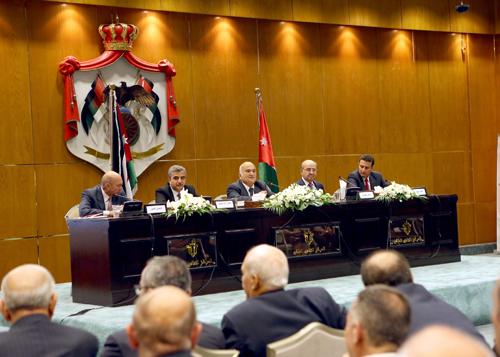You are here
‘Concerns persist despite progress in human rights system’
By Sawsan Tabazah - Nov 27,2017 - Last updated at Nov 28,2017
AMMAN — Closing the gap between the stipulation and enforcement of legislation protecting individual’s rights and freedoms require collaborative effort between the state and the civil society, National Human Rights Centre Commissioner General Musa Breizat said on Sunday.
Speaking during a lecture titled “Human Rights Challenges in Jordan” held at the Arab Thought Forum (ATF), Breizat said the human rights system in Jordan, which is “slowly improving”, started with His Majesty King Abdullah’s directives to the government in 2013 to implement the centre’s recommendations as the region was witnessing the so-called Arab spring.
During the period, freedoms became a concern to both the people and the state accompanied with security concerns, he noted.
Breizat stressed that “disregard to human rights” was the main reason that triggered the protest movements in which people revolted against existing ruling systems in the Arab world.
Secretary General of the ATF Mohammad Abu Hammour, who chaired the lecture, said that these regional and international political events created a new security situation that needed to be handled within a clear humanitarian strategy.
Although the government has implemented judicial reforms, legislative amendments, assigned around 100 human rights envoys in governmental institutions and launched awareness campaigns to develop human rights system in Jordan, many problems at the legislative and enforcement level still persist, Breizat said.
There are many legal loopholes and law enforcement breaches that are considered detrimental to rights and freedoms outlined in the international conventions and the Jordanian Constitution, he said, noting that they are executed “under the pretext of protecting the security and safety of the country”.
Restrictions on the freedom of speech in more than five articles of the Penal Code, Cyber Crimes Law and Anti-Terrorism Law require the creation of criteria outlining what is considered as “a threat to the state’s security” or a “harmful criticism of public figures or public institutions”, Breizat said.
Such criteria are vital to prevent breaches of the Jordanian Constitution’s articles, including Article 7 that guarantees privacy and Article 8, which states that no Jordanian should be placed under detention or imprisonment but under the rule of law, the general commissioner highlighted, noting cases of arbitrary arrest and detention.
General practices and policies are even more important in ensuring social justice and competitiveness in education, Breizat said.
Reforms in all sectors require building trust between civil society institutions and the government, which has been lost “as civil society institutions were neglected by the government for their alleged lack of experience or foreign financing”, he said.
Abu Hammour stressed that following up on the state of human rights in the country helps enhance public awareness towards reforms, law enforcement and citizen’s response to the reform process.
Related Articles
AMMAN — Through its role in overseeing the constitutionality of laws and interpreting the Constitution, the Constitutional Court is a fundam
AMMAN — A coalition of civil society members and youth on Monday met with deputies and government representatives to discuss Jordan’s commit
AMMAN — The Arab Thought Forum (ATF) on Tuesday issued a publication compiling its dialogue sessions of the Royal discussion papers authored














